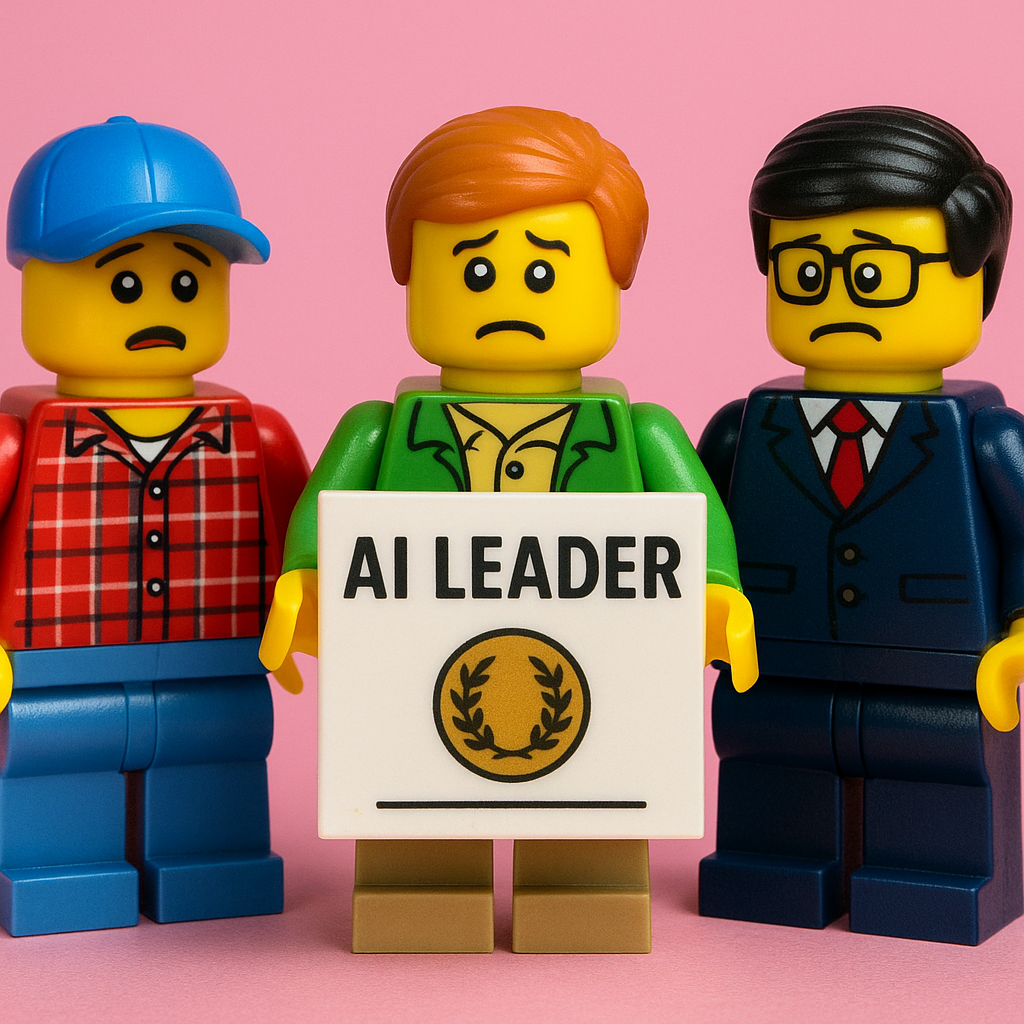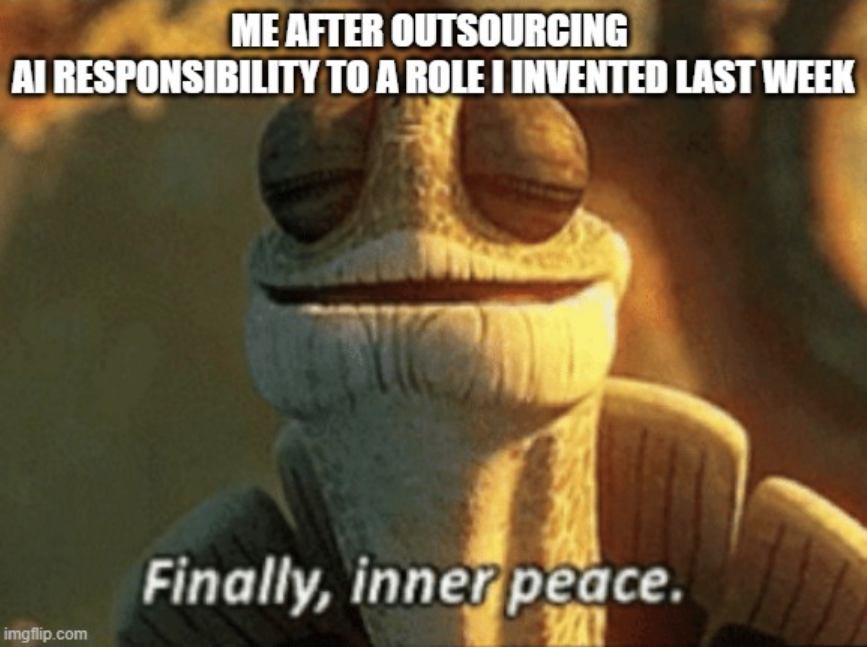No, a crash course won’t make you an AI leader

Lately, I keep seeing weekend seminars popping up: Promising to turn you into an “AI leader”, prepare you for the role of Chief AI Officer, or help your company tick the compliance box for the EU AI Act. The messaging is clear: show up for two days, leave with a certificate, and suddenly your organization has AI competency.
Does that sound convenient? Yes! Is it dangerously misleading? Also Yes!
Does it get sold out anyway? 💀
Unfortunately, what’s being sold here isn’t transformation, it’s reassurance. And that won’t protect you from the real responsibilities that come with deploying AI at scale, especially in a regulatory environment that now requires you to prove that your teams are both competent and empowered to use AI responsibly. Now, you might think: “Sure, you can’t become an AI leader in a weekend—but what’s the harm in learning the basics?” On the surface, that sounds reasonable. But the problem isn’t the learning, it’s the illusion of readiness it creates. When a certificate suggests you’re now “qualified” to lead AI in your organization, it replaces the hard work of capability-building with a shortcut that feels productive but changes nothing. Worse, it can lead to false confidence, performative leadership, and decisions made without the depth to support them. Learning basics is good; mistaking them for strategic maturity is not. Self-organized learning is essential, especially for non-technical leaders. Understanding the basics of AI, its limitations, and its real-world implications should be part of every executive’s toolkit; not to become experts, but to ask better questions and make better decisions over time.
If you could solve transformation in a weekend, you would’ve done it by now
Change fatigue is real. So it’s tempting when someone offers a shortcut. A crisp two-day seminar. A certificate with “AI Officer” on it. A promise that you’re now ready to lead the future. I’m sorry to break it to you, but no title, no badge, no training event will fix what’s broken if your organization lacks the ability to learn, unlearn, and relearn as part of daily life. You can’t inject AI competency from the outside. You have to build it in.
Weekend seminars don’t change behavior. Culture does.
AI capability isn’t a line item
Most orgs aren’t suffering from a lack of information. They’re suffering from an inability to apply it consistently. A certificate doesn’t change that. A multiple-choice test at the end of a seminar won’t suddenly make your managers ask better questions, experiment responsibly, or challenge outdated assumptions.Worse: these kinds of “quick fix” approaches can create a false sense of progress. You’ve ticked the box, updated your Linkedin profile, announced the initiative, but nothing has actually changed. AI requires new patterns of work, new definitions of value, and a comfort with ambiguity that no workshop can magically install.
Transformation doesn’t come with a certificate
The work of AI transformation is messy. It involves tearing down legacy processes, empowering teams to make decisions faster, and shifting how you measure success. It’s cross-functional, ongoing, and often more than just uncomfortable. Change hurts.
So when you’re offered a seminar that wraps all this up into a neat package: beware. Real change doesn’t look like that.
Real change isn’t convenient.
What your company needs isn’t a weekend boost of inspiration. It needs a culture where learning is continuous, literacy is widespread, and leadership owns the responsibility for evolving the system, not outsourcing it.
If you still think the problem is skills, you’re not looking deep enough
Yes, technical skills matter. But the real blockers in AI adoption aren’t tools or training gaps, they’re structural. They’re the slow approvals, the siloed data, the outdated KPIs, the fear of failure, the lack of space for experimentation. None of that gets solved by putting a handful of people through a seminar, no matter how slick the website or how shiny the PDF you get at the end. A single event won’t shift how decisions are made. A certificate won’t fix the absence of psychological safety. A role title won’t overcome a culture that punishes risk.
You don’t need another training to feel good about progress. You need to build systems that allow progress to emerge, daily, from within. AI maturity is not a credential; it’s a condition of your organization’s culture. And you can’t buy that in a weekend.

what to do instead
If you’re serious about building AI capability in your organization, forget the fast-track badges. Focus on structure, not symbolism. Here’s what I do in projects that actually work out and move the needle:
-
Embed continuous learning into everyday work. AI isn’t a one-time rollout; it’s a moving target. Make learning loops part of your operating rhythm: cross-functional learning sessions, hands-on experimentation, peer exchange, and internal showcases. Not slides; not hype—practice. Make sure that people have time to do so. If they are buried in meetings that should have been an email, they won’t get far.
-
Distribute AI literacy, don’t centralize it. You don’t need a single “AI Officer”; you need hundreds of AI-literate employees who are confident to use the tools, question their outcomes, and escalate when something breaks. Make that normal. Make it safe.
-
Build trust into the process, not just compliance into the policy. The EU AI Act is about accountability. That starts with real governance: role clarity, transparency, auditability—and also with culture. If your people are afraid to touch AI without permission, you’ve failed before you began.
-
Tie AI efforts to actual business decisions. Stop treating AI like innovation theater. Use it to challenge cost structures, improve decisions, reduce friction, and rethink where human time is best spent. If it doesn’t change how value is created, it’s noise.
-
Invest in enablement, not vanity roles. The smartest AI initiatives are backed by practical enablement: internal communities, reusable templates, clear guardrails, and real leadership engagement. That takes time and commitment.
Transformation won’t happen in a seminar. But it will happen: quietly and sustainably, if you create the conditions for it.
Published on:
Learn more